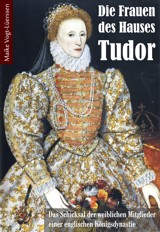[Zu Beginn des Jahres 1621] "While Elizabeth was still confined to her lying-in chamber [nach der Geburt ihres fünften Kindes], a doleful scene took place in another apartment of Cüstrin castle. Her husband set his name to a document offering to resign the crown of Bohemia if, in return, the Palatine was restored to him. He asked also that the Imperial ban might be removed from his name and from the names of the principal followers. These terms had been drawn up by James I. ... The King of Bohemia had humbled himself to no effect. Ferdinand II was going to make an example of the vassal who had defied the house of Habsburg. Ambassadors from the King of England, who had hastened to the German Princes of the Union, the Archduke Albert, and the Emperor, with proposals of peace, were finding themselves 'laughed at for their pains'. The Elector of Brandenburg [George William, Schwager von Friedrich V.] had received an Imperial mandate, 'requiring him not to harbour the King in his dominions, nor to suffer the Queen to stay in them longer then he could truly excuse it upon her Majesty's inability to go on'. ... The Winter King and Queen were reunited in Upper Westphalia in mid-March [1621]. A convoy of nineteen troops of horse was awaiting them at Bielefeld. The Prince of Orange [Moritz von Oranien] had sent this escort to conduct them safely into his country. [In allen anderen Herrschaften, selbst in England, waren sie als "unerwünscht" erklärt worden.] His invitation, which was warm, mentioned that a town residence at the Hague was already furnished for their reception. A palace at Breda would be available as a summer residence for her Majesty when her husband took the field again." Ihr neues Zuhause im heutigen Den Haag war "der Hof te Wassenaer". "The Bohemian exiles were not to be poor. The States were making them a grant of ten thousand guilders a month, and from England came another twenty-six thousand guilders monthly." (in: Carola Oman: Elizabeth of Bohemia, id., p. 240/242).
[Im Jahr 1622, als Friedrich V. in Sedan lebte, schrieb er Folgendes an seine geliebte Gattin Elisabeth Stuart, die in Den Haag ihr neues Zuhause gefunden hatte]: "... My thoughts are often with my soul's star, whom I love perfectly, even to death. Amongst the many afflictions which God sends to me, not the least is to be so long separated from my sweetheart, whose portrait I carry everywhere ... If it would please God to give us a little corner of the world in which we could live happily I would ask no more. But I don't like living at the Hague at all." (in: Carola Oman: Elizabeth of Bohemia, id., p. 272).
Der letzte Brief, den wir von ihm haben, 12 Tage vor seinem Tod, am 17. November 1632, an seine geliebte Gattin Elisabeth Stuart geschrieben (Übersetzung vom Französischen ins Englische): "My most dear heart, Mr Schwarzenberg, passing through here, desired to carry my letters to you, which I have not been able to refuse him, even though I write to you twice almost every week. I have today received one of your letters, but I will not reply until tomorrow by the ordinary post because I think that this gentleman will be a long time on the road. He tells me that he would be happy to carry a bundle of portraits. I am uncertain whether to give them to him. He says that he has organized his affairs extremely well, but I think that although he is being sent away with good words there are weighty matters the Prince [of Orange?] wanted to say. He shows himself to be extremely affectionate towards me. He has been most brave today. I will not make this any longer except to assure you that I shall be until my grave, My dear and only heart, Your most faithful friend and most affectionate servant Frederick." (in: The Correspondence of Elizabeth Stuart, Queen of Bohemia. Volume II: 1632-1642. Edited by Nadine Akkerman. Oxford 2011, pp. 144-145).











